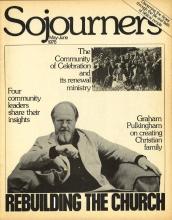Anticipate the all-pervasive, all-encompassing nature of God’s call to give him your lives unconditionally (1 Peter 4:2). Believe in God’s faithfulness to provide the grace and strength necessary to complete all he calls you to and at the same time to provide for all your needs (1 Corinthians 1:8, Luke 12:31). Trust God. Don’t be overwhelmed with what you think he will ask you to do. Gently and firmly he will enable you to do everything he asks of you today and will lead you into new tasks tomorrow. His re-echoing question is, “Do you trust my love enough to do my will today?”
Go beyond a vague commitment to God alone toward a total commitment to one another as the body of Christ, the incarnate presence of God in the midst of the world (1 John 4:20). Offer yourselves to each other without reservation and receive each other without reservation. Rely on one another’s total commitment and call each other to it. Love each other in truth, boldly and compassionately. By continual teaching, encouragement, and exhortation, help each other to recognize the choices between God’s will and self-will. Support each other in carrying out these choices realistically. Those who answer God’s call on their lives will increasingly express Christ centeredness, willingness to give themselves. These will be drawn into greater authority and responsibility, into ever deeper servanthood. Those who continually express self-centeredness, unwillingness to give themselves, unwillingness to hear God’s call on their lives should be expected to live out their choice in a more suitable surrounding, i.e. outside the community.
Read the Full Article

